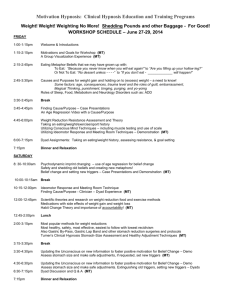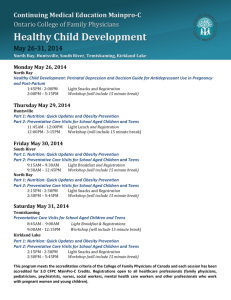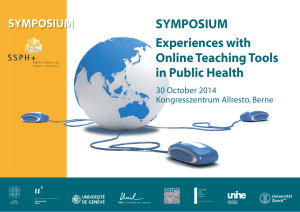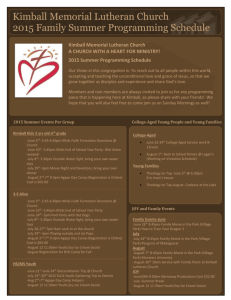Agenda and Goals: Analytics Symposium (VSS)
advertisement
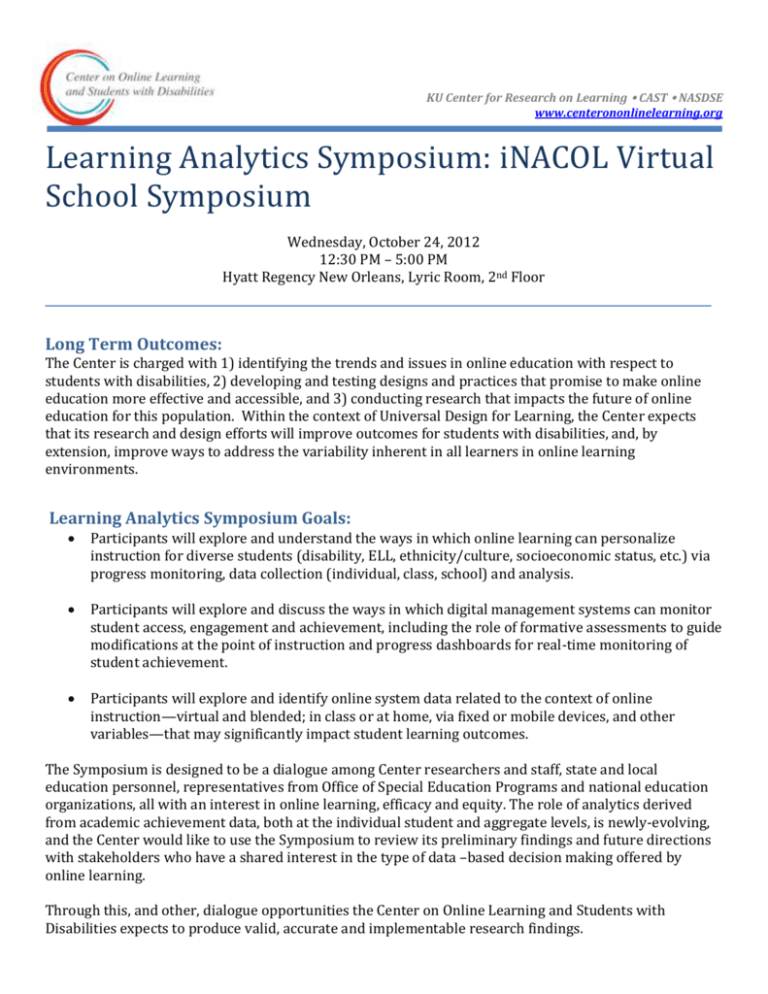
KU Center for Research on Learning CAST NASDSE www.centerononlinelearning.org Learning Analytics Symposium: iNACOL Virtual School Symposium Wednesday, October 24, 2012 12:30 PM – 5:00 PM Hyatt Regency New Orleans, Lyric Room, 2nd Floor Long Term Outcomes: The Center is charged with 1) identifying the trends and issues in online education with respect to students with disabilities, 2) developing and testing designs and practices that promise to make online education more effective and accessible, and 3) conducting research that impacts the future of online education for this population. Within the context of Universal Design for Learning, the Center expects that its research and design efforts will improve outcomes for students with disabilities, and, by extension, improve ways to address the variability inherent in all learners in online learning environments. Learning Analytics Symposium Goals: Participants will explore and understand the ways in which online learning can personalize instruction for diverse students (disability, ELL, ethnicity/culture, socioeconomic status, etc.) via progress monitoring, data collection (individual, class, school) and analysis. Participants will explore and discuss the ways in which digital management systems can monitor student access, engagement and achievement, including the role of formative assessments to guide modifications at the point of instruction and progress dashboards for real-time monitoring of student achievement. Participants will explore and identify online system data related to the context of online instruction—virtual and blended; in class or at home, via fixed or mobile devices, and other variables—that may significantly impact student learning outcomes. The Symposium is designed to be a dialogue among Center researchers and staff, state and local education personnel, representatives from Office of Special Education Programs and national education organizations, all with an interest in online learning, efficacy and equity. The role of analytics derived from academic achievement data, both at the individual student and aggregate levels, is newly-evolving, and the Center would like to use the Symposium to review its preliminary findings and future directions with stakeholders who have a shared interest in the type of data –based decision making offered by online learning. Through this, and other, dialogue opportunities the Center on Online Learning and Students with Disabilities expects to produce valid, accurate and implementable research findings. Learning Analytics Symposium Agenda 12:30PM – 12:45PM – Lunch Lunch will be served in the room 12:45 PM - 1:00 PM – Greetings & Introductions Introductions: o Center on Online Learning and Students with Disabilities Jamie Basham (Kansas University) & Skip Stahl (CAST) o Center on Emerging Technologies Todd Rose (CAST) & Sami Daley (CAST) o Participants 1:00PM – 1:30PM – Overview and Expectations Overview of our goals for the day Introduction to today’s topic 1:30PM – 2:30PM –Group Discussions Learner variability System design Contextual variability 2:30PM – 3:00PM – Report out 3:00PM – 3:15PM – Break Afternoon snack will be served 3:15PM – 3:45PM – Invited Presentation Knovation 3:45PM – 4:15PM – Reflection on presentation 4:15PM – 4:45PM – Discussion reporting 4:45PM – 5:00PM – Wrap up Initial Question Sets A. Learner Variables What student information can be used to personalize instruction for diverse learners (disability, ELL, ethnicity/culture, socioeconomic status, etc.) in online learning systems? What student usage “signals” could be correlated with student information to facilitate personalization in online learning systems? What supports and scaffolds possible in online learning systems are essential to ensure the success of diverse learners, and which aspects of their use should be tracked? B. System Design Variables What design features of online learning systems are essential for addressing the needs of diverse learners? What student usage or student customization data related to the use of these features is the most important to track? Which type of data collection and analysis —individual or aggregate (class, school, district, etc.) will prove most useful for monitoring the progress of diverse learners? C. Contextual Variables What contextual variables relative to online learning impact the achievement/success of diverse students? What specific information about the context of online learning is important to acquire? What correlations might emerge when the context of online learning is an inherent part of the data collection process? The Center is a partnership involving the University of Kansas Center for Research on Learning (KUCRL), the Center for Applied Special Technology (CAST), and the National Association of State Directors of Special Education (NASDSE). The Center is funded by the Office of Special Education Programs (OSEP) in the U.S. Department of Education. h

